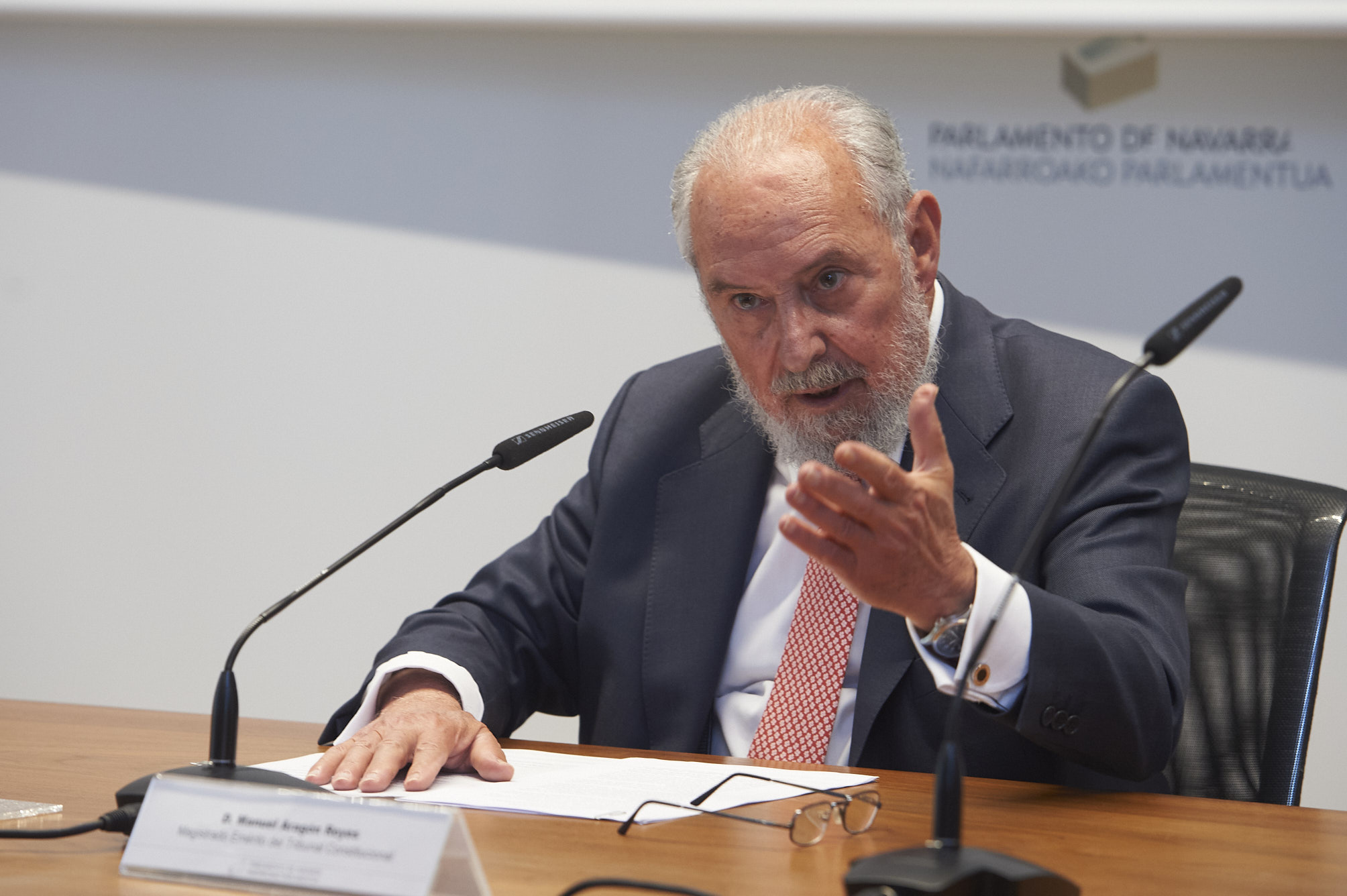Manuel Aragón: "The State, in agreementwith the constitutional rules, has unrenounceable competences, of obligatory exercise, which it cannot endorse to the Autonomous Communities".
The emeritus magistrate of the Constitutional Court criticised the government's actions during the pandemic, which led to situations of lack of coordination and inefficiency.

PhotoIñakiPorto/Manuel Aragón, during the lecturehe gave in the Parliament of Navarre.
04 | 05 | 2022
The Full Professor of Constitutional Law and emeritus magistrate of the Constitutional Court, Manuel Aragón Reyes, starred in the last lecture of the classroom of Parliamentary Law, a forum promoted by the School of Law and the Parliament of Navarra. The magistrate offered an analysis of the management of the pandemic from the constitutional point of view, through the declaration of the two states of alama. He valued the exemplary behavior of the citizens and the partnership of the Autonomous Communities while criticizing the actions of the Government and its neglect of its functions. "The State, in agreement with the constitutional rules, has unrenounceable competences, of obligatory exercise, that it cannot endorse to the Autonomous Communities", he affirmed. "The State, in subject of public health, has competences to dictate substantive measures to all the territories; the same for the development of the right to the Education, in all its extremes".
Manuel Aragón added that this delegation of functions to the Autonomous Communities led to a variety of actions characterised by lack of coordination, confusion and, in some cases, even territorial confrontation, which did not contribute to the effectiveness of the autonomous decisions that have been taken. When the law is twisted, the law is avenged," he said, "with inefficiency and disorganisation. "One of the problems at the root of this statusis, it seems to me, the inadequacy of combating a general evil, which extends throughout the national territory, with measures that are territorially limited to the scope of each autonomous community".
Aragón then alluded to the requirement of judicial authorisation prior to the adoption of rules establishing limitations by the regional legislator: "We are turning the judiciary into a legislator. A real nonsense".
Manuel Aragón analyzed the context of the declarations of the two states of alarm. The magistrate considered that the declaration of the first state of alarm (March 14, 2020) was a measure whose legitimacy is clear. However, and in line with sentence 148/2021 of the Constitutional Court, the Full Professor considered that with that decision, not only were rights limited, but also rights such as freedom of movement were suspended. He added that with the declaration of the second State of Alarm on October 25, two decisions were adopted that are not allowed by the Constitution. Firstly, the extension of 6 months, when the law only allows extensions of 15 days. And secondly, the delegation to the Autonomous Communities of the adoption of exceptional measures.
Aragón lamented the presidentialism shown by President Pedro Sánchez and how the Constitution is being flouted in some of its parts. "Those who believe that efficiency justifies non-observance of the Constitution are mistaken. Non-observance of the law creates a climate of mistrust and does not end up achieving effective and permanent realities", he insisted.
The President of the Parliament of Navarre, Unai Hualde, was in charge of presenting discussion paper, accompanied by the professor of Constitutional Lawand director of classroomof Parliamentary Law, Asunción de la Iglesia. Hualde stated that due to the health crisis, governments have had to take decisions that, on occasions, have not had judicial backing, "statuswhich does not contribute to citizens' confidence in institutions, neither in politicians nor in judges, which is why any reflection on these aspects is useful to try to better understand the statusthat has occurred", he said.

